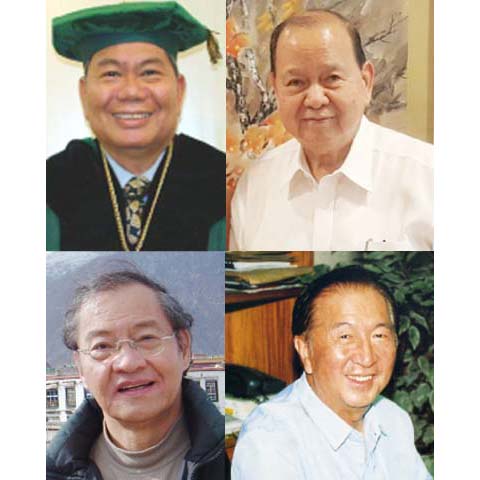At the 30th Anniversary General Assembly of the Philippine Association for Chinese Studies last Dec. 2, four “ambassadors” were given recognition. I was tasked by PACS president Dr. Tina Clemente of the University of the Philippines to introduce them.
It was an honor and privilege to present the honorees, considering their stature. But as Dr. Clemente said, I am the only one linked to all four, having worked with them directly and indirectly. It is no coincidence that all four of them are ambassadors, three designated by the Philippine government and one accorded that recognition by the Tsinoys for his vital role in cooperative endeavors and harmonious working relationship. I refer to the first honoree, lawyer Florencio Mallare.
I share this introduction with our readers for them to know these distinguished honorees.
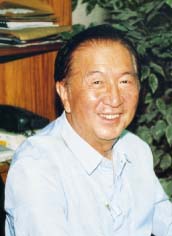 Atty. Florencio V. Mallare
Atty. Florencio V. Mallare
Tan Hua Gak (陳華嶽), as Tsinoys call him, is the publisher of World News, the leading Chinese language daily, leading not just in circulation and readership but also in substance and content.
I say this honestly and not out of bias because World News publishes Tulay Fortnightly Chinese-Filipino Digest, which will celebrate its 30th year next year, 2018. But before Tulay Fortnightly, World News published four issues of Tulay Literary Journal in 1987. I was the founding editor-in-chief of both the journal and the digest. Tulay demonstrates how farsighted Attorney Mallare was. He saw very early on the need to communicate with young Tsinoys who would not and could not read Chinese. Tulay, therefore, is a bridge of understanding between cultures and a bridge of tolerance among ages.
Attorney Mallare’s life experiences reflect Tsinoy history itself. If you go through books on constitutional law, the annotations on citizenship have his name because people like the late senators Jose Diokno and Jovito Salonga fought for his declaration as a natural-born citizen. He had also gone through the periods of Kuomintang persecution, defended the Yuyitung brothers’ case and became a founding member of Amity Club, one of the first organizations that pushed the improvement of Philippines-China relations.
Attorney Mallare holds a Bachelor of Laws degree from the Far Eastern University. He was one of the earliest members of PACS. When our beloved Auntie Jane, his late wife, was still with us, we used to have our annual spring and autumn festivals at his house. We enjoyed the famous sumptuous soup prepared by Auntie Jane for these occasions. Attorney Mallare and Auntie Jane also provided office space, for free, for the Philippines-China Development Resource Center, which did excellently in people-to-people exchanges between China and the Philippines.
PACS honors him for supporting its endeavors – World News co-convened many PACS conferences and supported its publications. He is the quintessential diplomat who works well with everyone. We call him Tulay’s tulay because despite reservations of his elderly stockholders against Kaisa and its activism, against PACS and its stand on the South China Sea issue, Attorney Mallare continued to stand by us because he sees the wisdom of accommodation, compromise and working together in causes beyond conflicts and misunderstanding.
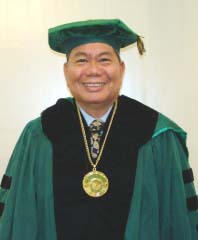 Ambassador Wilfrido Villacorta
Ambassador Wilfrido Villacorta
I’ve known Menito, as we fondly call him, since way back in the early 1970s. I was a fresh college graduate, not yet married. He convened the very first conference on Chinese overseas in Southeast Asia way back in 1972, jointly with Pagkakaisa Sa Pag-unlad, the predecessor of our present organization Kaisa Para Sa Kaunlaran. Menito surely agrees with me that the general sentiment at the time was still very antagonistic against the Chinese, generally called the “Jews of the Orient.” We’ve come a long way in the continuum of integration since then.
His views on the Association of Southeast Asian Nations and the common interests that bind us are much sought after. He believes that we can rise above our differences and conflicts to work together for the long-term and far-reaching benefits of our region.
Menito’s Ph.D. is in International Law and Relations. This made him the shoo-in appointee for the position of deputy secretary general of the ASEAN when the Philippines hosted the ASEAN in 2003 during President Arroyo’s term. During President P-Noy’s term, he was designated permanent representative of the Philippines to the ASEAN in 2010. He has now returned to De La Salle University as a fellow while working on his book on ASEAN-Philippines relations.
Menito has been at the forefront of efforts to enhance better understanding and effective communication among ASEAN countries – regardless of race, religion, beliefs or social class – promoting the idea of synergism and cooperation. He has always advocated that China is our near neighbor, we have to understand China, engage China and finally learn about and from China.
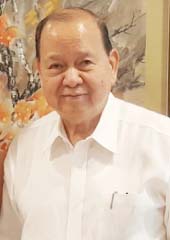 Special Envoy Carlos Chan
Special Envoy Carlos Chan
Sir Carlos Chan (施恭旗) has done so much to promote China in the Philippines and the Philippines in China. Loboc Children’s Choir of Bohol is now well known in China because he brought them to perform in many places in China. Sir Carlos likewise invites national and local public officials, media people and professionals to China to give them first-hand experience of the phenomenal Chinese growth and for them to understand where the Chinese people are coming from. He firmly believes that the China dream is not incompatible with the Philippine dream and both can cooperate in many fields.
Sir Carlos believes that promoting better understanding and enhancing knowledge about one another will go a long way in straightening out the issues that entangle and divide us. Thus, he supported many PACS endeavors through the years. In 2013, he funded the trip of seven China experts to engage China think-tanks and academics on the Philippine position of the maritime dispute. In 2014, he funded the return conference of China scholars here in the Philippines.
Sir Carlos is the rare breed of Tsinoy businessman who understands very well that supporting culture and education is equally important as promoting business success. His Oishi factories in China and Southeast Asia fly the Philippine flag because he is proud to show the world that the Philippines has much to offer. He is at present the chairman of our Kaisa Heritage Foundation and through us, he supported our low-cost housing projects in Baseco, Tondo, Cavite and through the Soong Ching Ling Foundation and Federation of Filipino-Chinese Chambers of Commerce and Industry Inc., he has given generously to build schools and rebuild communities after every calamity. His latest philanthropy was a considerable amount for the rehabilitation of Marawi. Last Dec. 6, he inaugurated a technological institute in Cavite to train Filipino scholars and workers.
For Philippines-China relations, he donated nearly RMB3.3 million to renovate the royal tomb of the Sultan of Sulu, the mosque and areas surrounding the Beiying Village in Dezhou, Shandong, China where the Sultan was buried. This year marks the 600th anniversary of the visit of the Sulu Sultan to Ming Emperor Yong Le in 1417.
We all wish him great success in his business endeavors because he shares so much of this success with the less fortunate. He is truly a special envoy that builds bridges of harmony, friendship and cooperation.
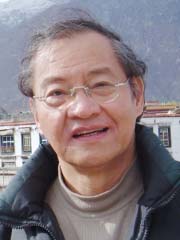 Ambassador Chito Sta. Romana
Ambassador Chito Sta. Romana
Ambassador Sta. Romana and I are products of the student activism of the 1970s. He, Jaime FlorCruz and Ericson Baculinao were in China when former president Ferdinand Marcos declared martial law and they stayed there for 30 years. Baculinao was the head of our student council during my junior year at the University of the Philippines. The three of them surprised the Tsinoy community with their ability to lecture in Chinese and English.
I met with all three of them in Beijing half a dozen times. The most memorable was our near midnight dialogue in 2000 with the former Chinese ambassador to the Philippines, Fu Ying, who was then working with China’s foreign affairs ministry.
In 1986, with the restoration of democracy, Chito was tapped by his brother-in-law Elfren Cruz to help at President Cory Aquino’s Presidential Management Staff. It was that encounter at Malacañang that spearheaded the re-organization of Kaisa in 1987.
The PMS came up with a very negative report about the Tsinoy community, pretty much blaming the Tsinoys for the economic ills the country was suffering from. We fast tracked the formation of Kaisa because we wanted to get prepared lest the Tsinoy community again become targeted as scapegoats and become like the “boat people” of Vietnam. We wrote a counter response to the PMS report asserting that Tsinoys are part and parcel of national society and their rise and fall are closely tied with that of the nation.
Chito has been closely linked with many of us at PACS from the very beginning. That’s why when he came back to stay permanently, he took over from me as PACS president. But he had to give up his post at PACS when he was named our ambassador to China.
His Senate confirmation was dubbed “makalaglag panga” or jaw dropping. The senators were all awed by the depth and width of his knowledge and understanding about China.
He led the 2013 trip to Beijing and Shanghai with six other China experts to engage the academics, strategists and experts on the South China Sea – an eye-opener for the Chinese counterparts. His love and sacrifices for the Philippines and the depth of his China knowledge make him most qualified to be our ambassador to China. It is an unenviable job but he successfully manages to balance his role as a diplomat and his role as an advocate for the Philippine position in the maritime dispute.
Like Ambassador Chan, he believes that opening channels of communication and diplomacy are the best way to solve conflicts and to push Philippines-China relations to greater heights. They both firmly promote the idea that our common interests and mutual benefits far outweigh our differences and the issues that divide us.
Categories
Tribute to four ‘ambassadors’
